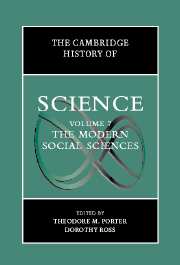Book contents
- Frontmatter
- 1 Introduction: Writing the History of Social Science
- PART I SCIENCES OF THE SOCIAL TO THE LATE NINETEENTH CENTURY
- 2 Genres and Objects of Social Inquiry, From the Enlightenment to 1890
- 3 Social Thought and Natural Science
- 4 Cause, Teleology, and Method
- 5 Utopian Socialism And Social Science
- 6 Social Surveys in the Eighteenth and Nineteenth Centuries
- 7 Scientific Ethnography and Travel, 1750–1850
- 8 History and Historicism
- 9 Bringing the Psyche into Scientific Focus
- 10 Continental Political Economy From the Physiocrats to the Marginal Revolution
- 11 British Economic Theory From Locke To Marshall
- 12 Marx and Marxism
- PART II THE DISCIPLINES IN WESTERN EUROPE AND NORTH AMERICA SINCE ABOUT 1880
- PART III THE INTERNATIONALIZATION OF THE SOCIAL SCIENCES
- PART IV SOCIAL SCIENCE AS DISCOURSE AND PRACTICE IN PUBLIC AND PRIVATE LIFE
- Index
- References
2 - Genres and Objects of Social Inquiry, From the Enlightenment to 1890
from PART I - SCIENCES OF THE SOCIAL TO THE LATE NINETEENTH CENTURY
Published online by Cambridge University Press: 28 March 2008
- Frontmatter
- 1 Introduction: Writing the History of Social Science
- PART I SCIENCES OF THE SOCIAL TO THE LATE NINETEENTH CENTURY
- 2 Genres and Objects of Social Inquiry, From the Enlightenment to 1890
- 3 Social Thought and Natural Science
- 4 Cause, Teleology, and Method
- 5 Utopian Socialism And Social Science
- 6 Social Surveys in the Eighteenth and Nineteenth Centuries
- 7 Scientific Ethnography and Travel, 1750–1850
- 8 History and Historicism
- 9 Bringing the Psyche into Scientific Focus
- 10 Continental Political Economy From the Physiocrats to the Marginal Revolution
- 11 British Economic Theory From Locke To Marshall
- 12 Marx and Marxism
- PART II THE DISCIPLINES IN WESTERN EUROPE AND NORTH AMERICA SINCE ABOUT 1880
- PART III THE INTERNATIONALIZATION OF THE SOCIAL SCIENCES
- PART IV SOCIAL SCIENCE AS DISCOURSE AND PRACTICE IN PUBLIC AND PRIVATE LIFE
- Index
- References
Summary
“Social science” entered the vocabulary of the West near the end of the eighteenth century, first of all in the United States and France. Many of its early enthusiasts, well into the nineteenth century, aspired to a single, unified science of the social, in stark contrast to the multiple disciplines that were taking shape by 1900. We might be tempted to frame the history of social science as a relentless process of advancing specialization, just as the history of natural science has often been conceived as a sequence of disciplinary separations from a once-unified philosophy. But such an understanding is no more satisfactory for social than for natural knowledge. Not least among its shortcomings is its privileging of the pure life of the intellect, the vita contemplativa, over the interventions and engagements of scientific life in practice. Social science has from its earliest beginnings aimed to administer and to change the world as well as to understand it. It did not spring forth from the head of humanity only, but from the body as well – from law, medicine, politics, administration, and religion, as well as from philosophy. Both intellectually and institutionally, it has always been diverse.
Seeing social science as part of philosophy has, nevertheless, some decided advantages over the most influential opposing view, disciplinary Whiggism, which regards each of the modern fields of knowledge as if they have always been coherent specialties. Strict disciplinary history encourages – if it does not require – a narrowness of perspective that leaves few openings for an inclusive cultural understanding. It can lead also to the rather absurd view that makes Aristotle the first psychologist, the first anthropologist, and one of the first sociologists, economists, and political scientists.
Information
- Type
- Chapter
- Information
- The Cambridge History of Science , pp. 11 - 39Publisher: Cambridge University PressPrint publication year: 2003
References
Accessibility standard: Unknown
Why this information is here
This section outlines the accessibility features of this content - including support for screen readers, full keyboard navigation and high-contrast display options. This may not be relevant for you.Accessibility Information
- 7
- Cited by
